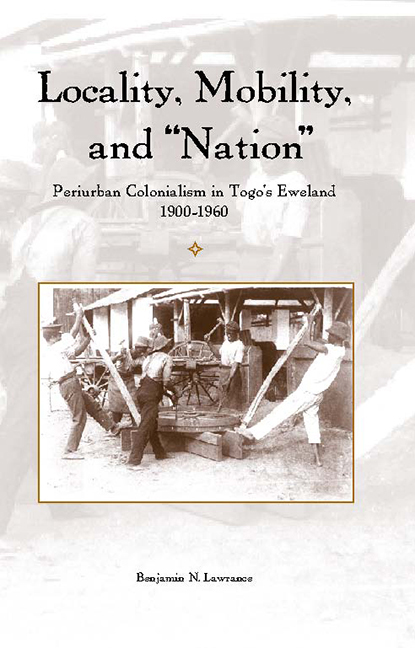Book contents
- Frontmatter
- Dedication
- Contents
- List of Illustrations
- Preface
- Notes on Orthography
- Map
- Introduction: Conceptualizing Periurban Colonialism in Sub-Saharan Africa
- 1 Mobility, Locality, and Ewe Identity in Periurban Eweland
- 2 Intervention and Dissent: Manufacturing the Model Periurban Chief
- 3 Crisis in an Ewe “Capital”: The Periurban Zone Descends on t he City
- 4 Vodou and Resistance: Politico-Religious Crises in t he Periurban Landscape
- 5 The German Togo-Bund and the Periurban Manifestations of “Nation”
- 6 From Eweland to la République Togolaise: Le Guide du Togo and the Periurban Circulation of Knowledge
- Epilogue
- Notes
- Bibliography
- Index
5 - The German Togo-Bund and the Periurban Manifestations of “Nation”
Published online by Cambridge University Press: 11 May 2017
- Frontmatter
- Dedication
- Contents
- List of Illustrations
- Preface
- Notes on Orthography
- Map
- Introduction: Conceptualizing Periurban Colonialism in Sub-Saharan Africa
- 1 Mobility, Locality, and Ewe Identity in Periurban Eweland
- 2 Intervention and Dissent: Manufacturing the Model Periurban Chief
- 3 Crisis in an Ewe “Capital”: The Periurban Zone Descends on t he City
- 4 Vodou and Resistance: Politico-Religious Crises in t he Periurban Landscape
- 5 The German Togo-Bund and the Periurban Manifestations of “Nation”
- 6 From Eweland to la République Togolaise: Le Guide du Togo and the Periurban Circulation of Knowledge
- Epilogue
- Notes
- Bibliography
- Index
Summary
Certainly if the members of the “Bund der Deutsch Togoländer” were operating in good faith, they would not be so narrow-minded as to send to the League such vague accusations.
—Unidentified Clerk, Ministry of Colonies, France, March 9, 1928In late 1925 a document came before the League of Nations Permanent Mandates Commission (PMC), bewailing the fate of the subjects of the former German protectorate of Togoland. The German text read, “[I]n the past, we Togolanders willingly placed ourselves under German protection, only to be now thrust under French domination.” It demanded immediate redress of the fate visited on them by the Treaty of Versailles and explicitly called for the return of Germany as the colonizing power. Germany had yet to be admitted to the League of Nations, however, and the petition did not find a warm reception among the victorious allied nations seated on the committee supervising the former German territories. The request was dismissed, but not before the story was picked up by a number of German newspapers. The extraordinary character of the group that authored this and additional documents—the Bund der deutschen Togoländer, or German Togo-Bund—raised important questions about what constituted a nation, which individuals were appropriately placed to speak for collective entities, and the differing attitudes of Europeans and Africans as to the legitimacy of nations.
This chapter and the next move from exploring how localized indigenous responses reshaped and reconstituted political authority to considering how “national” discourses about political and social reform drew on the existence of the periurban zone. This chapter examines the role of an organization, the Bund der deutschen Togoländer, in the anticolonial nationalist struggle in Eweland. Originally formed to champion the reunification of the former German colony of Togoland and the return of the German administration, it offered the first recorded collective expression of a Togolese identity. But although its aims were ostensibly Togolese, its membership and individual actions were markedly Ewe in flavor: the amorphous idea of Togolese unity was superimposed on a more tangible concept of Ewe unity, reflecting the political climate in periurban Eweland.
- Type
- Chapter
- Information
- Locality, Mobility, and "Nation"Periurban Colonialism in Togo's Eweland, 1900–1960, pp. 121 - 147Publisher: Boydell & BrewerPrint publication year: 2007

